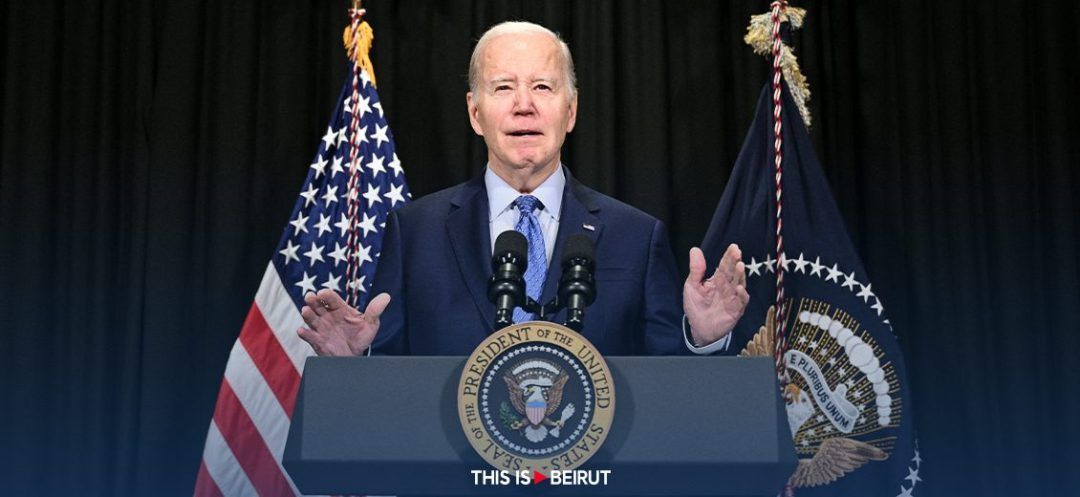- Home
- War in the Middle East
- Biden Criticizes Israel's Handling of Gaza War as a 'Mistake'

©(Brendan SMIALOWSKI, AFP)
Biden called Israel's handling of the Gaza war a "mistake" on Tuesday night, as global outrage grows over the humanitarian situation. This comes as Netanyahu must prove, on Wednesday in front of Israeli Supreme Court, that he has taken steps to increase the flow of humanitarian aid.
US President Joe Biden issued some of his sternest criticism yet of Israel's war on Hamas, calling its approach a "mistake" as the country faces a court deadline on Wednesday to prove it is not throttling aid to hunger-stricken Gaza.
With global outrage over the war growing, Biden rebuked Israeli Prime Minister Benjamin Netanyahu's handling of the conflict and reiterated the need for a ceasefire.
"I think what he's doing is a mistake. I don't agree with his approach," Biden said in an interview that aired on Tuesday night.
He urged Netanyahu "to just call for a ceasefire, allow for the next six, eight weeks, total access to all food and medicine going into the country," in remarks that underscored the dramatic shift in tone from Israel's main ally.
Biden's comments come as US, Qatari and Egyptian mediators seek progress on a truce and hostage release deal that also proposes ramping up aid deliveries to address a worsening hunger crisis in the Gaza Strip.
Israel insists that it is not limiting aid and complied with US and United Nations demands to scale up the deliveries.
The government faces a deadline on Wednesday from the country's Supreme Court to demonstrate that it has taken steps to increase the flow of humanitarian goods.
The case was brought by five NGOs that accuse Israel of restricting the entry of relief items and failing to provide basic necessities to Gazans.
The UN's agency for Palestinian refugees, UNRWA, said on Tuesday that more than 40% of food delivery missions were denied in February and March. None of the UNRWA food convoys have been approved since March, it added.
The Israeli agency that oversees supplies into the territory, COGAT, said that 741 aid trucks had crossed into Gaza on Sunday and Monday, with another 468 entering on Tuesday.
Before the October 7 start of the war, about 500 trucks supplied Gaza daily.
Samantha Power, administrator of the US Agency for International Development (USAID), said that recent days have seen a "sea change" in deliveries to Gaza, but added that Israel needs to do more.
"We have famine-like conditions in Gaza and supermarkets filled with food within a few kilometres away," she told US lawmakers during a Tuesday hearing.
The White House said that Israel has taken "some steps forward" in securing a truce, while Hamas' response has been "less than encouraging."
Hamas leader Ismail Haniyeh accused Israel of failing to respond to demands for an end to the war, while Netanyahu maintains that Israel must achieve the twin goals of bringing home "all our hostages" and eliminating militants from the strip.
Finding himself increasingly internationally isolated over the bloodiest-ever Gaza war, Netanyahu told military recruits on Tuesday that "no force in the world" would stop Israeli troops from entering the southern Gazan city of Rafah.
"We will complete the elimination of Hamas' battalions, including in Rafah," he said, after earlier declaring that a date for the operation had been set.
Speaking to reporters on Tuesday, US Secretary of State Antony Blinken said that he doubted that Israel would attack Rafah before next week, when a delegation is set to visit Washington.
Belal Al-Sabbagh and Fiachra Gibbons, with AFP
US President Joe Biden issued some of his sternest criticism yet of Israel's war on Hamas, calling its approach a "mistake" as the country faces a court deadline on Wednesday to prove it is not throttling aid to hunger-stricken Gaza.
With global outrage over the war growing, Biden rebuked Israeli Prime Minister Benjamin Netanyahu's handling of the conflict and reiterated the need for a ceasefire.
"I think what he's doing is a mistake. I don't agree with his approach," Biden said in an interview that aired on Tuesday night.
He urged Netanyahu "to just call for a ceasefire, allow for the next six, eight weeks, total access to all food and medicine going into the country," in remarks that underscored the dramatic shift in tone from Israel's main ally.
Biden's comments come as US, Qatari and Egyptian mediators seek progress on a truce and hostage release deal that also proposes ramping up aid deliveries to address a worsening hunger crisis in the Gaza Strip.
Israel insists that it is not limiting aid and complied with US and United Nations demands to scale up the deliveries.
The government faces a deadline on Wednesday from the country's Supreme Court to demonstrate that it has taken steps to increase the flow of humanitarian goods.
The case was brought by five NGOs that accuse Israel of restricting the entry of relief items and failing to provide basic necessities to Gazans.
The UN's agency for Palestinian refugees, UNRWA, said on Tuesday that more than 40% of food delivery missions were denied in February and March. None of the UNRWA food convoys have been approved since March, it added.
The Israeli agency that oversees supplies into the territory, COGAT, said that 741 aid trucks had crossed into Gaza on Sunday and Monday, with another 468 entering on Tuesday.
Before the October 7 start of the war, about 500 trucks supplied Gaza daily.
Samantha Power, administrator of the US Agency for International Development (USAID), said that recent days have seen a "sea change" in deliveries to Gaza, but added that Israel needs to do more.
"We have famine-like conditions in Gaza and supermarkets filled with food within a few kilometres away," she told US lawmakers during a Tuesday hearing.
'Less Than Encouraging'
The White House said that Israel has taken "some steps forward" in securing a truce, while Hamas' response has been "less than encouraging."
Hamas leader Ismail Haniyeh accused Israel of failing to respond to demands for an end to the war, while Netanyahu maintains that Israel must achieve the twin goals of bringing home "all our hostages" and eliminating militants from the strip.
Finding himself increasingly internationally isolated over the bloodiest-ever Gaza war, Netanyahu told military recruits on Tuesday that "no force in the world" would stop Israeli troops from entering the southern Gazan city of Rafah.
"We will complete the elimination of Hamas' battalions, including in Rafah," he said, after earlier declaring that a date for the operation had been set.
Speaking to reporters on Tuesday, US Secretary of State Antony Blinken said that he doubted that Israel would attack Rafah before next week, when a delegation is set to visit Washington.
Belal Al-Sabbagh and Fiachra Gibbons, with AFP
Read more



Comments